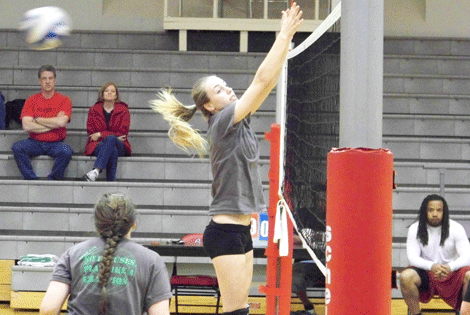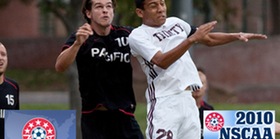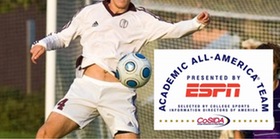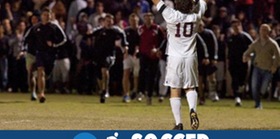(Story courtesy of NCAA.com)
SAN DIEGO, Calif. - It was a carefree summer day last July as Claire Cordua headed to the beach with her boyfriend near her hometown of San Diego. But, as she drove down the road, that all quickly changed for the rising freshman volleyball player at Rhodes College.
Cordua was a migraine headache sufferer, like her mother, so
when the pain came on that day she was not alarmed. But, then, her
vision got blurry and the left side of her body went numb. She
really doesn't remember what happened after that.
"My boyfriend told me I lost control of the car and went limp in
the seat," said Cordua. "He had to reach over and steer the car out
of oncoming traffic."
After stopping the car safely in the median, he called 911 and told
the operator that Cordua was having a stroke.
"They didn't think I was (having a stroke) because I was only 18,
and normally 18-year-olds don't have strokes," said Cordua.
"Luckily, the fire station was right down the street and the
firemen came to the car. My face was drooping, my hand wouldn't
move, my leg wouldn't move. They took me to the hospital
immediately."
Doctors first tried to treat the stroke with clot-busting
medications, but when the medications did not work, doctors turned
to Dr. Giuseppe Ammirati, an expert in stroke treatment, who had
not even started his first day at the hospital.
Using X-rays and a micro-catheter, Ammirati was able to send
clot-busting drugs directly into the brain to break up the clot -
something that at one time would have needed major brain
surgery.
"I remember going back to my bed after the first surgery and
everything was moving again, which was a huge deal that soon after
a stroke," said Cordua.
Because of the quick treatment Cordua escaped the damaging effects
of the stroke, although she did need to undergo surgery the next
day to remove a brain aneurysm that was caused from all the
pressure built up in her head.
After the initial scares, the long road to recovery began - not an
easy task for an active student-athlete.
"I was in the hospital for two weeks and for the first week I had
to stay in bed - I couldn't walk," said Cordua. "I had to just sit
there."
While her brain recovered, Cordua's muscles weakened.
"I knew how to walk, but after sitting in bed for a week, my
muscles just felt like they had shrunken up," said Cordua. "I was
having trouble walking properly and if I turned too fast I would
get dizzy. When I went home, just showering was tough. I would have
to nap afterwards because I felt really weak. I had to put time
limits on everything."
Shortly after the incident, Rhodes head coach Samantha Lambert
visited Cordua while on a recruiting trip for another player, and
was amazed that the young woman was doing so well.
"When I saw her a few weeks after the stroke, I would have never
have known anything had happened," said Lambert. "Everything was
the same except when she would get really tired her lip drooped a
little bit."
The doctors advised Cordua delay starting college until the spring
to rest her brain, and give her body time to regain its' muscle
memory before enduring the stress of starting college and playing
volleyball on the campus in Memphis, Tenn. -- thousands of miles
from home.
"She came in this spring and made huge strides on the court," said
Lambert. "She had been doing some physical rehabilitation, but not
out playing volleyball. When I tested her early on, I told her it
was not going to be where she wanted to be, but need to look at the
progress she'll make over the course of spring practice. She worked
hard and wanted to come in the gym every chance she could."
"The hardest part was that I knew how well I could play volleyball
before the stroke, and my body wouldn't allow me to play at that
level anymore," said Cordua. "I couldn't jump as high or hit as
hard. I had to go backwards before I progressed."
Cordua's teammates and Lambert were supportive throughout her
comeback, and helped her through many frustrating times during
spring practice.
"The first time we were playing six-on-six, she got a little
freaked out and had that deer-in-the-headlights looked," said
Lambert. "I could see the tears coming, and I told her to take a
deep breath."
"Coach Sam (Lambert) really pushed me, especially with weight
lifting getting me back to where I used to be," said Cordua. "I
talked to her about how I was feeling and what was wrong, and she
gave me a workout that really helped. By the end of spring practice
I got back to where I had been before the stroke."
Cordua continues to work on her strength and conditioning this
summer, along with playing pick-up volleyball with her former high
school and club teammates. She is anxiously awaiting the start of
preseason practice on August 20, and one day soon wearing the
Rhodes College jersey.
"Playing in the spring isn't the same as wearing the jersey and
playing in tournaments," said Cordua. "I'm really excited to start
playing in the fall."
But, for now, Cordua is back to enjoying those carefree summer
days.



































































.jpg?max_width=280&max_height=139&crop=true)




















































































































.jpg?max_width=280&max_height=139&crop=true)


















































































































































































